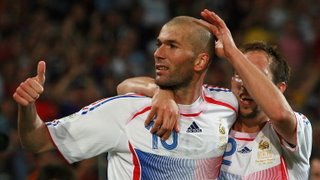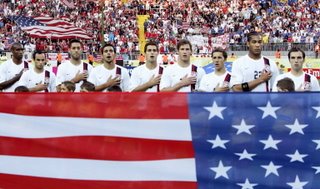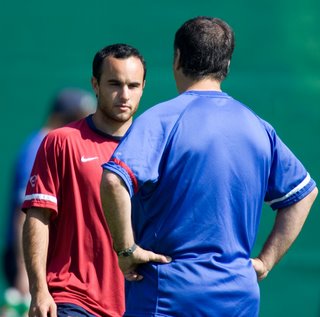Wednesday, June 28, 2006
The Problem of Mystery
Here is one take by Maritain and here is an ongoing discussion on the matter (in the comments section).
Tuesday, June 27, 2006
Zidane Extends His Playing Days At Least One More Game
 It is always nice when a class act has some moments like this ... especially in his last tournament: Zinedine Zidane sets up a goal with perfectly bending free kick and then scores his own on a beautiful play in the box as France beats Spain 3-1.
It is always nice when a class act has some moments like this ... especially in his last tournament: Zinedine Zidane sets up a goal with perfectly bending free kick and then scores his own on a beautiful play in the box as France beats Spain 3-1.It actually reminded me of the good ol' days for Zidane when he played for the best team and was playing his best soccer, even winning the Footballer of the Year award.

This reminds me of an article la nouvelle théologie linked to: "Soccer as Sacrament."
Monday, June 26, 2006
Lessons from 24
Friday, June 23, 2006
"I've Found God." Another Scientist Finds God
I’ve found God, says man who cracked the genome
THE scientist who led the team that cracked the human genome is to publish a book explaining why he now believes in the existence of God and is convinced that miracles are real.Francis Collins, the director of the US National Human Genome Research Institute, claims there is a rational basis for a creator and that scientific discoveries bring man “closer to God”.
His book, The Language of God, to be published in September [or in July as Amazon site says], will reopen the age-old debate about the relationship between science and faith. “One of the great tragedies of our time is this impression that has been created that science and religion have to be at war,” said Collins, 56. “I don’t see that as necessary at all and I think it is deeply disappointing that the shrill voices that occupy the extremes of this spectrum have dominated the stage for the past 20 years.”
For Collins, unravelling the human genome did not create a conflict in his mind. Instead, it allowed him to “glimpse at the workings of God”.
“When you make a breakthrough it is a moment of scientific exhilaration because you have been on this search and seem to have found it,” he said. “But it is also a moment where I at least feel closeness to the creator in the sense of having now perceived something that no human knew before but God knew all along.
“When you have for the first time in front of you this 3.1 billion-letter instruction book that conveys all kinds of information and all kinds of mystery about humankind, you can’t survey that going through page after page without a sense of awe. I can’t help but look at those pages and have a vague sense that this is giving me a glimpse of God’s mind.”
Collins joins a line of scientists whose research deepened their belief in God. Isaac Newton, whose discovery of the laws of gravity reshaped our understanding of the universe, said: “This most beautiful system could only proceed from the dominion of an intelligent and powerful being.”
Although Einstein revolutionised our thinking about time, gravity and the conversion of matter to energy, he believed the universe had a creator. “I want to know His thoughts; the rest are details,” he said. ...
Among Collins’s most controversial beliefs is that of “theistic evolution”, which claims natural selection is the tool that God chose to create man. In his version of the theory, he argues that man will not evolve further.
“I see God’s hand at work through the mechanism of evolution. If God chose to create human beings in his image and decided that the mechanism of evolution was an elegant way to accomplish that goal, who are we to say that is not the way,” he says.
“Scientifically, the forces of evolution by natural selection have been profoundly affected for humankind by the changes in culture and environment and the expansion of the human species to 6 billion members. So what you see is pretty much what you get.”
Collins was an atheist until the age of 27, when as a young doctor he was impressed by the strength that faith gave to some of his most critical patients.
“They had terrible diseases from which they were probably not going to escape, and yet instead of railing at God they seemed to lean on their faith as a source of great comfort and reassurance,” he said. “That was interesting, puzzling and unsettling.”
He decided to visit a Methodist minister and was given a copy of C S Lewis’s Mere Christianity, which argues that God is a rational possibility. The book transformed his life. “It was an argument I was not prepared to hear,” he said. “I was very happy with the idea that God didn’t exist, and had no interest in me. And yet at the same time, I could not turn away.”
His epiphany came when he went hiking through the Cascade Mountains in Washington state. He said: “It was a beautiful afternoon and suddenly the remarkable beauty of creation around me was so overwhelming, I felt, ‘I cannot resist this another moment’.”
Collins believes that science cannot be used to refute the existence of God because it is confined to the “natural” world. In this light he believes miracles are a real possibility. “If one is willing to accept the existence of God or some supernatural force outside nature then it is not a logical problem to admit that, occasionally, a supernatural force might stage an invasion,” he says.
Tuesday, June 20, 2006
More Deeply Rooted in Freedom ... and Religiously So
 Recently returned from Acton Institute's annual Acton University. It was quite an event. Met many good people and heard some worthwhile talks. The Q & A opened up the sessions to further good discussion and at times some important clarifications.
Recently returned from Acton Institute's annual Acton University. It was quite an event. Met many good people and heard some worthwhile talks. The Q & A opened up the sessions to further good discussion and at times some important clarifications.Aside from Fr. Sirico's typically moving closing talk, I would say the highlight for most was "Making Freedom a Reality: Estonia's Path from Communism to the Free Market," the talk by the former Prime Minister of Estonia, Dr. Mart Laar (see photo).
You can read a blurb about it here and you actually can hear the talk here.
I should have said "the highlight with regard to talks" because the conversation during breaks, at meals, and at the hospitality times at the end of each day were quite rewarding as well. Some good friendships continued and some new ones were embarked upon.
The danger of recent rhetoric about "options for the poor" is that it tends to deprive the impoverished of their intrinsic human dignity by implying that no wrong perpetrated by them is caused by themselves. Rather, all faults are said to be caused by environment or "structures" of society, whatever they might be. This dangerous theoretical position is a hold over--an intellectual hold over--from the influence of Rousseau in modern thought. To put the issue more positively, we can have saints who are poor, saints who are rich, and saints who are everywhere in-between. The same obviously holds true for sinners. What we cannot have is a saint or a sinner who is automatically made so by his external social condition alone.
Nor, to cover the other extreme, is it true that our political and social institutions make no difference at all in our moral character. Aristotle quite clearly maintains, as does Aquinas following him, that a certain sufficiency of wealth and political participation is advisable for the possibility of virtue for ordinary people. The real issue here is what kind of political, moral, and economic ideas and institutions cause this sufficiency to come into being through the workings of human enterprise itself. Many theories and ideas about helping the poor do not help them, even when it is claimed that they do. Not a few ideas even destroy them. In practice, the intention to help someone, whatever his situation, is not by itself a guarantee that the help will do what it is supposed to do. The poor should not be conceived as objects of one's social experiments.
Saturday, June 17, 2006
U.S. Ties in World Cup
 US and Italy tie 1-1.
US and Italy tie 1-1.I'll take that.
Now just for Italy to beat the Czech Republic and for the U.S. to beat Ghana.
It can happen.
Tuesday, June 13, 2006
Acton and Freedom: A week back in Grand Rapids
For more and related info, I suggest you check out Acton Power Blog.
Friday, June 09, 2006
Thursday, June 08, 2006
Zarqawi Killed
Good job, U.S. military and the Iraqis who helped.
Let's hope the MSM covers this story appropriately by recognizing the good done by the U.S. military and the Iraqi people. In the bit I have seen, it seems not.
Who is Abu Zarqawi? A monster.
Tuesday, June 06, 2006
Being Wrong, Believing Wrong, and Doing Wrong: Some Notes on a Review
In between the last two paragraphs, I originally wrote but had to cut out because of limited space:
Supplying a rational foundation for religious liberty is important for Hasson. The constitutional and legal arguments matter, but as Mary Dyer found out, something can be legally justified without necessarily being morally justified. Consider the case of Gedhun Choekyi Nyima. Arrested as a six-year-old in 1995, he has been in the custody of the Chinese government ever since. His charge? Tibetan Buddhists believe that he is the reincarnation of the Panchen Lama, second to the Dalai Lama. The American State Department has complained numerous times that this is a violation of religious liberty. The Chinese respond with a legal argument, of sorts. American or any foreign “protests,” it is said, “are an improper interference in their internal affairs.” Under Chinese law, Hasson reports, “the decision to detain one of their citizens, whether six years old or sixty, for any reason or no reason, is theirs to make.” If all that matters is the legal argument, then yes the Chinese government is justified. However, as Hasson argues, the moral argument for religious liberty matters too. Freedom is “a human right, not just a constitutional one.” As a human right, it is
a universal moral limit on the government’s power. It doesn’t come from Chinese law in the first place, so Chinese law, while it may violate religious freedom, can never really repeal it. Religious liberty is as much a human right in China as it is here, regardless of what China’s law says.
In other words, just as it was morally wrong for the Pilgrims to hang Mary Dyer and just as it was wrong for the teacher to implement the Park Rangers’ code in disallowing Zach to read from his Beginner’s Bible in front of the entire class, it is also wrong for the Chinese government to imprison anyone solely on account of belonging to a religious community. Freedom matters. The right to religious freedom is a basic one. Regardless of what governments do, they should especially respect the rights that are prior to them and that they are supposed to protect. Though these rights may be violated, as Hasson points out, “they can’t be eliminated.”
One void in this otherwise worthy read is a consideration of what Hasson’s solution would look like in today’s America. Would there still be a federal holiday for Christmas? Would federal offices shut down on Good Friday? Would any special or preferential treatment be given to Christian events or even to the public recognition of a God, as is with our motto, our coinage, the Pledge, and among other things the prayer that begins the Congressional session? Hasson argues for “an authentic pluralism that allows all faiths into the public square.” He says this “follows from who we are.” How about who we are as Americans and our cultural heritage? This country was founded and has flourished as one with strong roots and continual ties to its Christian heritage and its Judeo-Christian ethic. The faith of many Christians is one strong factor in the identity of America and it has played a significant role in the culture of the country. If Hasson’s argument is built upon who we are as humans, then why not incorporate who we are and have been as Americans into his solution? Is it improbable? If so, I would like to have read why.
The story of America begins with the Pilgrims. It is not just a history of a people, however. It is more than that. The story of America has unfolded as a drama, one with many sub-plots but one over-riding theme: the desire for freedom. Though at times she has fallen short of her ideals, America has grown to be a place where religious freedom has found a home. Though the final act has yet to be played out, freedom is safer as long as we all recognize that in this pluralistic society no matter how right we think we are our neighbor still has the right to be wrong.
Thursday, June 01, 2006
The Right To Be Wrong
Mary Dyer was regarded as a “very proper and comely young woman”—that is, before she broke the law and was hanged. Her crime: being a Quaker in Massachusetts Bay Colony. Laws against this were on the books and notice had been given. Everything was legal. Was it moral?
Three hundred years later, Zach, a first-grade student, was excited to learn that his teacher was going to let him read in front of the class for the first time. She added a personal touch to the experience by allowing him to read from his favorite book, which Zach brought the next day: the Beginner's Bible. The teacher told him he could not read it in front of the class and would have to read it to her in private. Is this right?
These are just two of the many anecdotes Kevin Seamus Hasson relates in The Right To Be Wrong: Ending the Culture War over Religion in America, his narrative account of the struggle over religious liberty. The work explains how certain events and laws helped to shape the codification of religious liberty in the United States—for good and for bad.

